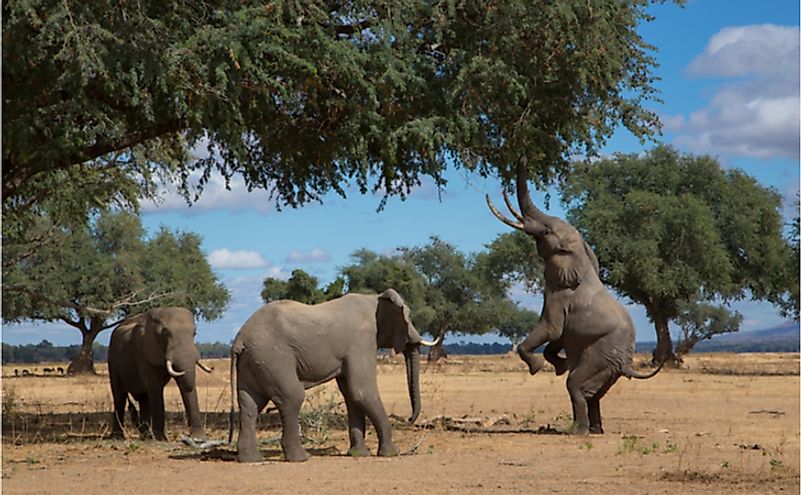What Do Elephants Eat?

Elephants are the largest terrestrial animals on the planet although the African elephant is visibly much larger than the Asian elephant. Elephants are herbivorous animals and will consume almost anything vegetarian from bark, leaves, shrubs, twigs, roots, fruits, and flowers. For their size, it is understandable that elephants require large quantities of food. They use their trunks and tusks to dig out roots, uproot plants, break branches, and pluck leaves.
What Do Elephants Eat?
The African elephant is significantly more prominent compared to the Asian elephant and therefore eats more food than the latter. Elephants prefer feeding late in the evening and early in the morning when the sunshine is minimal. The African elephant inhabits savannahs, marshes, deserts, and mountains. They are primarily browsers and can reach high branches. These elephants eat soft shoots, shrubs, fruits, and leaves. They are also known to rip bark and uproot young trees. The Asian elephant inhabits the forests of Thailand, southern India, and Sri Lanka. They prefer the evergreen forests and are therefore grazers. They feed on the readily available bamboo in addition to low woody plants and grasses.
In captivity, elephants feed on lettuce, cabbage, apples, bananas, and sugarcane, as well as other vegetables and fruits. Hay is the staple food of captive elephant since it can be produced in mass and is much cheaper. Captive elephants consume much less than wild elephants because they spend less energy searching for food and are often guaranteed a next meal.
How Much Do Elephants Eat?
On average, an African elephant requires about 220-250 kilograms of food and 60 liters of water while its Asian counterpart consumes about 130-150 kilograms and 40 liters of water. Elephants consume much food because of their massive size, but their digestive system only digests about 40% of what they eat. If elephants digested 80%, they would be significantly much bigger. Due to the inefficiency of their digestive system, elephants spend up to 18 hours a day foraging. They prefer living closer to the source of food and water and can cross water bodies in search of food.
Elephants have 13 pairs of teeth, but unlike other mammals that replace their baby teeth once, elephants replace their teeth throughout their lifespan. This adaptation is due to the extreme grinding of the teeth that wear the enamel when consuming tough roots and tree barks.
Impact On Ecology
During the rainy season, elephants do not need to travel long distances to feed, but during the dry season, they can travel for over 80 miles in a single day. Luckily, elephants have a good memory and can memorize water points and feeding locations. They can also smell water below the surface and use their trunks and tusks to create water holes. Large populations of elephants can be devastating to the ecosystem as they uproot trees and roots.











